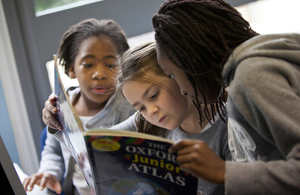Guidance on promoting British values in schools published
Strengthened guidance on improving the spiritual, moral, social and cultural development of pupils.

The Department for Education has today (27 November 2014) published guidance on promoting British values in schools to ensure young people leave school prepared for life in modern Britain.
The guidance aims to help both independent and state-maintained schools understand their responsibilities in this area. All have a duty to ‘actively promote’ the fundamental British values of democracy, the rule of law, individual liberty, and mutual respect and tolerance of those with different faiths and beliefs. These values were first set out by the government in the ‘Prevent’ strategy in 2011.
Until now schools have been required to ‘respect’ these values, but as a result of changes brought in earlier in the year all schools must now have a clear strategy for embedding these values and show how their work with pupils has been effective in doing so. In a letter to the Education Select Committee in March, the Parliamentary Under Secretary of State for Schools Lord Nash explained the changes were designed to “tighten up the standards on pupil welfare to improve safeguarding, and the standards on spiritual, moral, social and cultural development of pupils to strengthen the barriers to extremism”.
Ofsted and the independent inspectorates now take the work of schools in this area into account during inspections.
Publishing the guidance today, Lord Nash said:
A key part of our plan for education is to ensure children become valuable and fully rounded members of society who treat others with respect and tolerance, regardless of background.
We want every school to promote the basic British values of democracy, the rule of law, individual liberty, and mutual respect and tolerance for those of different faiths and beliefs.
This ensures young people understand the importance of respect and leave school fully prepared for life in modern Britain.
Examples of the understanding and knowledge pupils are expected to learn include:
-
an understanding of how citizens can influence decision-making through the democratic process
-
an understanding that the freedom to hold other faiths and beliefs is protected in law
-
an acceptance that people having different faiths or beliefs to oneself (or having none) should be accepted and tolerated, and should not be the cause of prejudicial or discriminatory behaviour
-
an understanding of the importance of identifying and combatting discrimination
Examples of actions schools can take to promote British values are to:
-
include in suitable parts of the curriculum - as appropriate for the age of pupils - material on the strengths, advantages and disadvantages of democracy, and how democracy and the law works in Britain, in contrast to other forms of government in other countries
-
ensure all pupils within the school have a voice that is listened to, and demonstrate how democracy works by actively promoting democratic processes such as a school council whose members are voted for by the pupils
-
use opportunities such as general or local elections to hold mock elections to promote fundamental British values and provide pupils with the opportunity to learn how to argue and defend points of view
-
consider the role of extra-curricular activity, including any run directly by pupils, in promoting fundamental British values
The government today also published its interim response to a consultation of the revised Independent Schools Standards (ISS). The revised standards cover independent schools, academies and free schools, ensuring they - along with local authority-maintained schools - must promote British values.
Notes to editors
-
See the SMSC guidance for maintained schools and for independent schools, academies and free schools.
-
See also the government’s consultation interim response on part 2 of the Independent School Standards, covering the SMSC development of pupils.
DfE media enquiries
Central newsdesk - for journalists 020 7783 8300